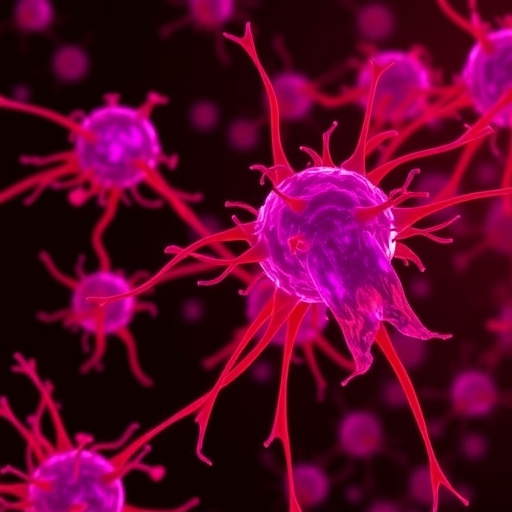In a groundbreaking study published in Scientific Reports, researchers have unveiled significant findings surrounding the long-term effects of growth hormone therapy in pediatric patients suffering from growth hormone deficiency. This research is particularly pivotal as it underscores not only the physiological benefits of such treatment but also the intriguing implications it carries for cellular regeneration and overall health in children. The study led by Wędrychowicz, Sielatycka, and Kucia meticulously explores how prolonged administration of growth hormone positively impacts circulating stem cells in affected children.
Growth hormone deficiency is a condition characterized by insufficient production of growth hormone from the pituitary gland, leading to notable growth delays and other developmental issues in children. Traditionally, the approach for managing this deficiency has involved administering growth hormone. While the immediate benefits of such treatment – namely, improved growth rates and cognitive development – have been documented, the long-term cellular effects were not fully understood until now. The recent study aims to fill this gap, shedding light on how extended exposure to growth hormone modifies the landscape of circulating stem cells.
The study involved a cohort of pediatric patients diagnosed with growth hormone deficiency who were subjected to long-term growth hormone therapy. Researchers meticulously monitored these patients over a significant duration to evaluate not only their growth metrics but also the profiles of circulating stem cells in their blood. Using advanced techniques in stem cell characterization, they conducted comprehensive blood analyses that revealed essential insights into the regenerative capacities of these cells.
Results indicated a marked increase in the number and functionality of circulating stem cells among those receiving long-term growth hormone therapy. This suggests that growth hormone therapy does not merely stimulate growth but also enhances the body’s regenerative potential, providing a dual benefit. Particularly in the context of growing children, this finding opens avenues for further investigation into how growth hormone can play a role in overall health, aiding not just in physical growth but in tissue repair and regeneration as well.
Moreover, the implications of enhanced circulating stem cells extend beyond just growth hormone deficiency. The authors discuss potential applications in various medical fields, including regenerative medicine, where stem cells are harnessed to repair or replace damaged tissues. In light of this, the study poses significant questions regarding the broader applications of growth hormone therapy, encouraging further research into its mechanisms and potential therapeutic uses.
The study also notes that the interaction between growth hormone and stem cells is complex and likely influenced by several factors, including the age of the patient, the duration of therapy, and the specific conditions for which the therapy is administered. This complexity necessitates a deeper exploration of the molecular pathways through which growth hormone exerts its effects on stem cell biology to delineate precisely how and why these benefits manifest.
Interestingly, patient monitoring revealed that the beneficial effects on circulating stem cells were not uniform across all individuals. Variability in response to therapy was observed, and the study highlights the importance of personalized medicine – tailoring growth hormone therapy to the individual patient’s needs and biochemistry. This approach could optimize therapeutic outcomes and minimize potential adverse effects in vulnerable pediatric populations.
Furthermore, the research addresses the potential psychological aspects related to treatment. Children undergoing growth hormone therapy often face social pressures associated with their size and growth patterns. By contributing to enhanced physical development and cellular health, long-term growth hormone therapy may also have profound effects on these children’s self-esteem and social interactions, leading to a more holistic approach to their overall well-being.
The methodology employed in the research serves as a model for future studies aiming to explore the multifaceted benefits of hormonal therapies. Advanced analytical techniques, including flow cytometry and molecular profiling, provided robust data that allowed the researchers to draw convincing conclusions regarding the interaction of growth hormone with stem cell populations over time.
Equally important is the ethical consideration surrounding long-term hormonal treatments in children. The researchers emphasize the need for healthcare providers to weigh the potential benefits against the risks, ensuring that such therapies are pursued judiciously and ethically. Parental education and involvement in treatment decisions are critical as well, fostering a collaborative approach to managing growth hormone deficiency.
As scientific discourse surrounding growth hormones and stem cell dynamics evolves, this research is poised to influence clinical practices and therapeutic guidelines. It advocates for a more integrative understanding of how growth factors contribute not only to growth but to the foundation of overall cellular health and diversity.
In conclusion, the discovery of long-term growth hormone’s positive influence on circulating stem cells offers a renewed perspective on the therapeutic possibilities available to pediatric patients with growth hormone deficiency. Encouragingly, it prompts a re-evaluation of existing growth hormone therapies as not just agents of physical growth, but as facilitators of broader health benefits, thus paving the way for future innovations in treatment strategies.
This study exemplifies the continual evolution of knowledge in the realms of endocrinology and regenerative medicine, urging both researchers and clinicians to remain vigilant in their pursuit of understanding the complex interplay between hormones and cellular biology. As this field progresses, the hope is that more children can benefit from advancements born out of such critical research, ensuring a healthier, more robust developmental trajectory.
Subject of Research: Growth hormone therapy’s effect on circulating stem cells in pediatric growth hormone deficiency.
Article Title: Positive influence of long-term growth hormone therapy on circulating stem cells in pediatric patients with growth hormone deficiency.
Article References: Wędrychowicz, A., Sielatycka,, K., Kucia, M. et al. Positive influence of long-term growth hormone therapy on circulating stem cells in pediatric patients with growth hormone deficiency. Sci Rep 15, 36418 (2025). https://doi.org/10.1038/s41598-025-20532-6
Image Credits: AI Generated
DOI: 10.1038/s41598-025-20532-6
Keywords: growth hormone deficiency, pediatric therapy, stem cells, regenerative medicine, long-term therapy effects.




